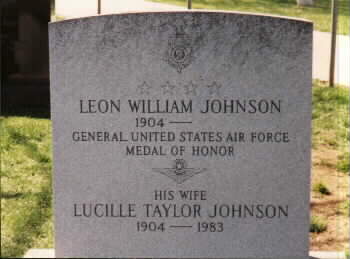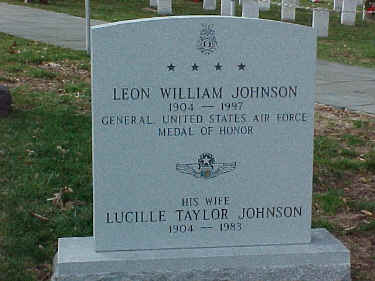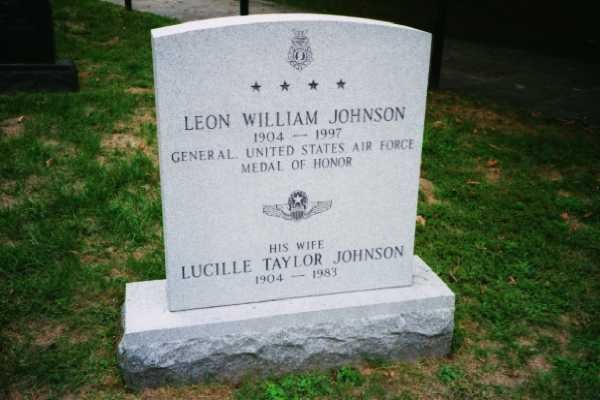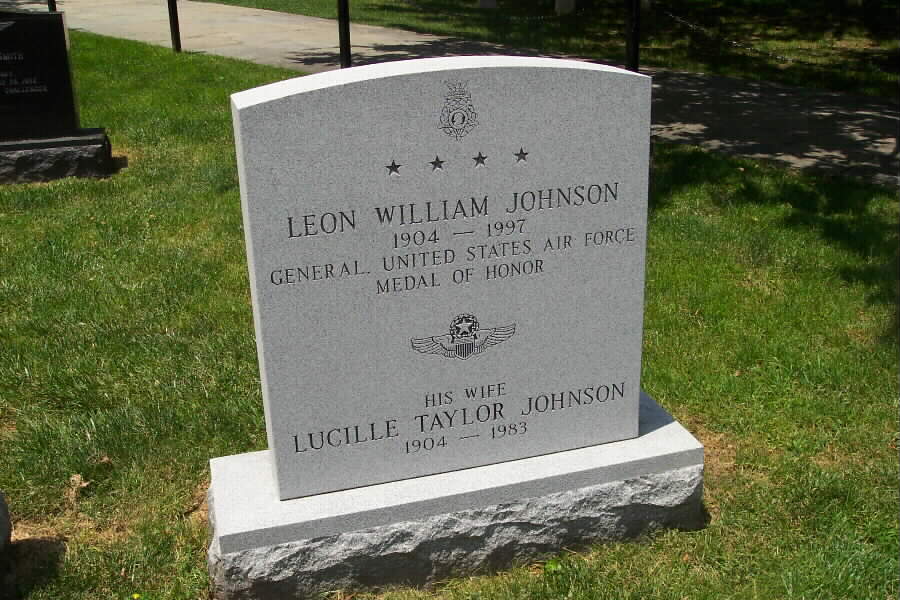From a contemporary press report:
Leon William Johnson, 93, a retired Air Force general who was awarded the Medal of Honor for his leadership in a critical World War II low-level air raid on the vital Ploesti oil refineries in Romania in August 1943, died of a respiratory infection November 10, 1997 at Belvoir Woods health care facility in Fairfax, Virginia.
General Johnson served more than 40 years in the Army and the Air Force, retiring in 1965 after a three-year assignment as director of the National Security Council’s Net Evaluation Subcommittee. Earlier positions included service in Paris as air deputy to the supreme allied commander in Europe and duty in Washington on a NATO military representatives committee.
During World War II, he was one of the first four flying officers of the 8th Air Force, serving as assistant chief of staff for operations during the unit’s formative period. In June 1942, he went to England with the 8th Air Force, and in January 1943, he became commander of the 44th bomb group.
That group was assigned to North Africa on loan to the 9th Air Force in June 1943, and it was from North Africa that then-Colonel Johnson led his bombers in the attack on Ploesti, which had been described by British Prime Minister Winston Churchill as “the taproot of German mechanized power.”
Yank magazine in its November 1943 issue described Ploesti as “unctious with oozing black earth, pregnant with oil-soaked wooden derricks and glistening refineries . . . settled tauntingly on the Danubian slope between the towering Carpathians and the Green Transylvanian Alps, the richest bombing target in all Europe but protected by the most impenetrable curtain of flak in the world.”
From takeoff in North Africa to an island guiding point in the Agean Sea and then over Greece to Romania, the flight to Ploesti and the return covered 2,400 miles. En route, Colonel Johnson’s group became separated from the main body of the attack aircraft in cloud conditions over mountainous terrain. When he reached his target — a refinery that produced 485,000 tons of petroleum products a year — it had already been bombed by earlier waves of attacking aircraft. Its defenders had been alerted and were ready for more attacks.
According to a description of the attack in Yank magazine, Colonel Johnson’s target had become “an inferno of 1,500-foot flames and exploding time bombs. Without a moment’s hesitation, Colonel Johnson heads his group into the inferno at 30 feet. Just as the flames lapped over his wings a miracle happens. There is an explosion in the midst of the roaring mass, and an updraft opens a tunnel of air in the flames. Johnson and six planes shoot through the tunnel. They drop their bombs. The rear gunners see the following six planes head into the inferno . . . the flames close in . . . only one comes out.”
Colonel Johnson’s bomber was burned jet black by its proximity to the flames, and it was shot through several times by antiaircraft fire, but it returned safely.
“By his gallant courage, brilliant leadership and superior flying skills, Colonel Johnson so led his formation as to destroy totally the important refining plants and installations which were the object of his mission,” according to the citation that accompanied his award of the Medal of Honor, which is the U.S. military’s highest award for gallantry in combat.
Colonel Johnson, at the Medal of Honor presentation ceremony in England on Nov. 22, 1943, said: “I cannot consider this a personal award. I consider this a citation for the leader of the group in acknowledgment of a job well done by the group,”
General Johnson, a native of Columbia, Missouri, graduated from the U.S. Military Academy at West Point in 1926. For three years, he was an infantry officer, then in 1929 “decided that things looked more interesting from the air.”
He transferred to the Army Air Corps, learned to fly and later served in the Philippines before World War II.
After the war, he transferred to the newly organized Air Force, served in Washington and Colorado, then returned to England, where he organized the 3rd Air Force, which supplied transport aircraft for the Berlin Airlift and maintenance facilities for Strategic Air Command aircraft on rotational training missions in Europe.
Later he was commander of the Continental Air Command at Mitchell Air Force Base in New York and the Air Force representative to the United Nations military staff committee.
In addition to the Medal of Honor, his military decorations included a Distinguished Service Medal with two Oak Leaf Clusters, a Silver Star, a Legion of Merit, a Distinguished Flying Cross with one Oak Leaf Cluster and an Air Medal with three Oak Leaf Clusters.
In retirement, General Johnson lived in McLean, Virginia, and did consulting work. His avocations included golf and growing flowers. He was president of the National Capitol Dahlia Society.
His wife of 54 years, Lucille Taylor Johnson, died in 1983.
Survivors include two daughters, Sue Vandenberg of Tucson and Sarah Abbott of Pensacola, Fla.; four grandsons; and two great-grandchildren
He had a reserved gravesite in Section 7-A of Arlington National Cemetery. His wife, Lucille Taylor Johnson (1904-1983), is buried in that site.
Courtesy of the United States Air Force
GENERAL LEON W. JOHNSON
Retired July 1961, Died Nov. 10, 1997
Leon W. Johnson was born in Columbia, Missouri, in 1904. He spent his boyhood in Columbia and Moline, Kansas. He graduated from the U.S. Military Academy and was commissioned a second lieutenant in June 1926. He later received a master of science degree in meteorology from the California Institute of Technology.
He was one of the first four flying officers of the Eighth Air Force and served as assistant chief of staff for operations for that command and during its formative period at Savannah, Georgia. He accompanied the Eighth Air Force to England in June 1942. In January 1943, he assumed command of the 44th Bomb Group and, in June of that year, took the group to Africa to assist the Ninth Air Force in the attack on the Ploesti oil fields in Rumania. For his part in that raid, he was awarded the Medal of Honor. On his return to England in September 1943, he organized the 14th Combat Wing and commanded it until the end of the war in Europe.
After V-E Day, he was assigned as chief of personnel services, Headquarters Army Air Forces in Washington, later becoming deputy to the assistant chief of air staff for personnel. In April 1947 he was assigned to Strategic Air Command as commanding general of the Fifteenth Air Force at Colorado Springs, Colorado.
The Air Force returned to England for the first time since World War II when General Johnson organized the Third Air Division (later redesignated the Third Air Force) there in August 1948, as a separate major command of the U.S. Air Force. The division provided facilities for maintenance and support of Strategic Air Command aircraft on rotational training missions to Europe and for transport aircraft used in the Berlin Airlift. In February 1950 General Johnson was appointed, in addition to his other duties, chief of the Military Assistance Advisory Group for the United Kingdom.
In February 1952, he was named commander of the Continental Air Command at Mitchel Air Force Base, New York. He was appointed in July 1953, U.S. Air Force Representative, Military Staff Committee, United Nations in addition to his primary duty as Continental Air Command commander.
Three years later he was named the U.S. Representative to the North Atlantic Military Committee, Military Representatives Committee and Standing Group of NATO, with duty station in Washington, D.C.
General Johnson next assumed duties in May 1958 as air deputy to the supreme allied commander Europe, at SHAPE Headquarters, Paris, France. He was retired July 31, 1961 with more than 34 years of military service. Six weeks later he was recalled to active duty to become the director, Net Evaluation Subcommittee Staff/National Security Council, with duty station
in the Pentagon.
General Johnson is a command pilot and in addition to the Medal of Honor he has been awarded the Distinguished Service Medal with oak leaf cluster, Silver Star, Legion of Merit, Distinguished Flying Cross with oak leaf cluster, and the Air Medal with three clusters. His foreign decorations include the French Legion of Honor in the Grade of Chevalier, French Croix de Guerre with palms, Belgian Croix de Guerre with palms, and the British Distinguished Flying Cross. He was promoted to general August 31, 1957.
JOHNSON, LEON W. (Air Mission)
Rank and organization: Colonel, U.S. Army Air Corps, 44th Bomber Group, 9th Air Force. Place and date: Ploesti Raid, Rumania, 1 August 1943. Entered service at: Moline, Kansas. Born: 13 September 1904, Columbia, Missouri. G.O. No.: 54, 7 September 1943.
Citation:
For conspicuous gallantry in action and intrepidity at the risk of his life above and beyond the call of duty on 1 August 1943. Colonel Johnson, as commanding officer of a heavy bombardment group, let the formation of the aircraft of his organization constituting the fourth element of the mass low-level bombing attack of the 9th U.S. Air Force against the vitally important enemy target of the Ploesti oil refineries. While proceeding to the target on this 2,400-mile flight, his element became separated from the leading elements of the mass formation in maintaining the formation of the unit while avoiding dangerous cumulous cloud conditions encountered over mountainous territory. Though temporarily lost, he reestablished contact with the third element and continued on the mission with this reduced force to the prearranged point of attack, where it was discovered that the target assigned to Colonel Johnson’s group had been attacked and damaged by a preceding element. Though having lost the element of surprise upon which the safety and success of such a daring form of mission in heavy bombardment aircraft so strongly depended, Colonel Johnson elected to carry out his planned low-level attack despite the thoroughly alerted defenses, the destructive antiaircraft fire, enemy fighter airplanes, the imminent danger of exploding delayed action bombs from the previous element, of oil fires and explosions, and of intense smoke obscuring the target. By his gallant courage, brilliant leadership, and superior flying skill, Colonel Johnson so led his formation as to destroy totally the important refining plants and installations which were the object of his mission. Colonel Johnson’s personal contribution to the success of this historic raid, and the conspicuous gallantry in action, and intrepidity at the risk of his life above and beyond the call of duty demonstrated by him on this occasion constitute such deeds of valor and distinguished service as have during our Nation’s history formed the finest traditions of our Armed Forces.
Family donates medal of WWII air commander
Courtesy of The Sentinel, October 19, 2008
Leon Abbott donated his grandfather’s World War II-era Medal of Honor to the Army Heritage and Education Center Saturday.
Colonel Leon Johnson’s memory was honored at a special ceremony with members of the Army Air Corps 44th Bomb Group at AHEC’s Ridgway Hall.
The medal, the first of its kind donated to AHEC, will complement the extensive collection of 44th Bomb Group material held at the museum.
Leon Johnson received the Medal of Honor for leadership in the daring daylight raid of the Ploesti Oil Fields in Romania on August 1, 1943.
The Ploesti raid also earned the 44th its second Distinguished Unit Citation. Flying B-24 Liberator high-altitude bombers at tree-top level, the 44th destroyed both of its assigned targets but lost 11 of its 37 bombers and crews.
During Operation Tidal Wave, the most highly decorated military mission in U.S. history, 179 B-24s took off on an 18-hour, 2,400 mile round trip mission to destroy the largest of the Nazi-held oil refineries at Ploesti, 30 miles north of Bucharest. The day would end with five U.S. Air Force airmen, including General Leon W. Johnson, earning the Medal of Honor for bravery, three posthumously. Fifty-four aircraft never returned.
Born in Columbia, Missouri, Leon Johnson died on November 10, 1997, in Fairfax, Virginia. He was 93 years old. He is buried in Arlington National Cemetery.
JOHNSON, LEON WILLIAM
GEN US AIR FORCE
WORLD WAR II, KOREA
- DATE OF BIRTH: 09/13/1904
- DATE OF DEATH: 11/10/1997
- BURIED AT: SECTION 7A SITE 209
ARLINGTON NATIONAL CEMETERY
Michael Robert Patterson was born in Arlington and is the son of a former officer of the US Army. So it was no wonder that sooner or later his interests drew him to American history and especially to American military history. Many of his articles can be found on renowned portals like the New York Times, Washingtonpost or Wikipedia.
Reviewed by: Michael Howard




